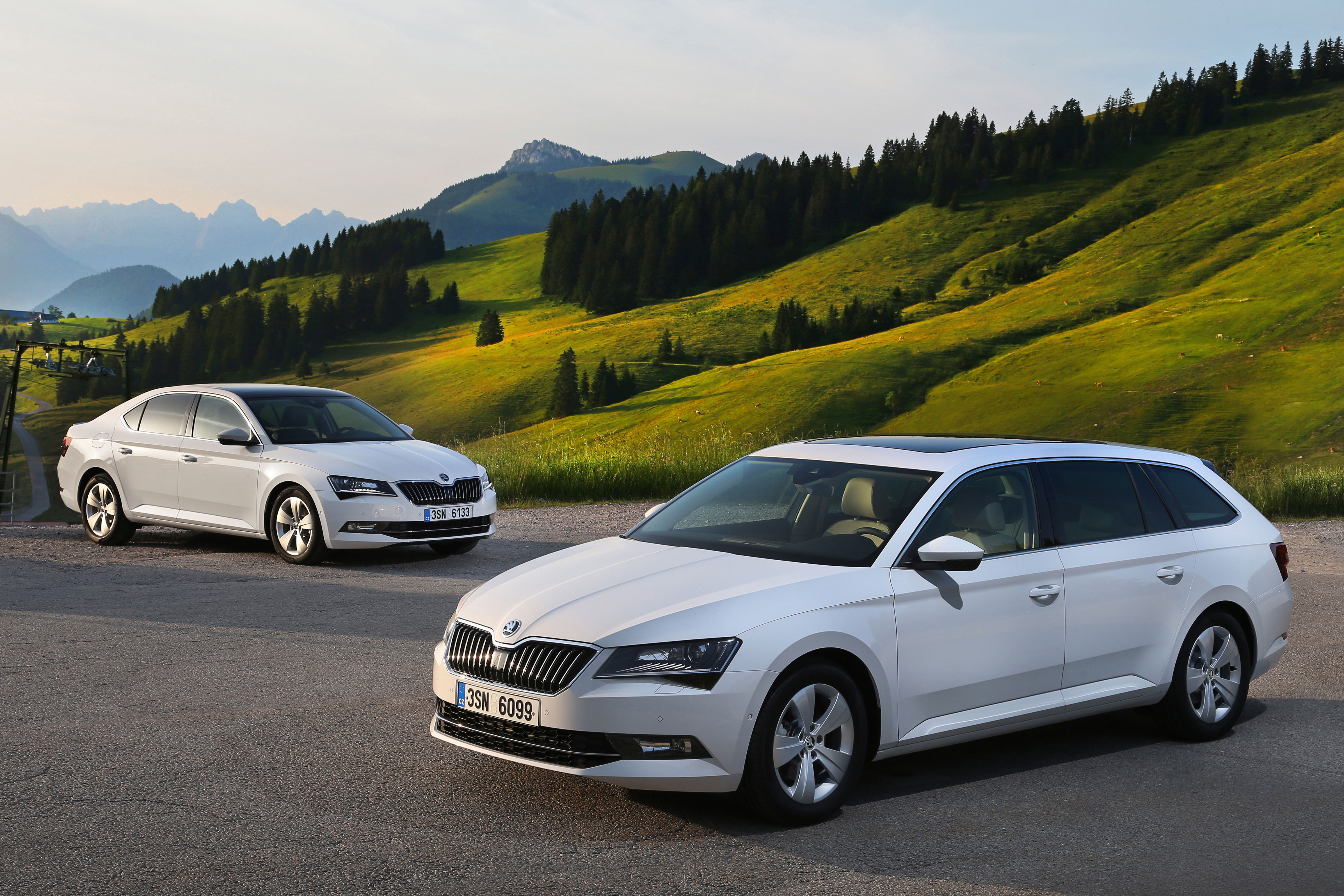The new SKODA Superb GreenLine: More than 1780 km on a Single Tank

- ŠKODA Superb GreenLine 1.6 TDI/88 kW consumes impressive 3.7 l/100 km and emits just 95g CO2/km (saloon version)
- Reduction in fuel consumption due to engine modifications and optimizing aerodynamics Already 33 ŠKODA models less than 100g CO2/km, 105 models below 120g CO2/km
- Already 33 ŠKODA models less than 100g CO2/km, 105 models below 120g CO2/km
Mladá Boleslav, 25 August 2015 – The new ŠKODA Superb boasts extremely low fuel consumption. This is particularly true of the new ŠKODA Superb GreenLine that ŠKODA will be presenting to the public for the first time at the IAA (Frankfurt International Motor Show). With an impressive fuel consumption of 3.7 l/100 km and CO2 emissions of just 95 g/km (hatchback version), the new ŠKODA Superb GreenLine 1.6 TDI/88 kW sets the environmental standard in its segment - both estate and hatchback version. With one trip to the petrol station, you can drive the ‘green’ version of ŠKODA’s new flagship more than 1780 kilometres.
The ŠKODA Superb GreenLine 1.6 TDI/88 kW is equipped with a manual six-speed gearbox. Just as the engines in the standard Superb, the 1.6 TDI is fitted with a start-stop system and brake energy recovery (recuperation) as standard. Additional features of the new GreenLine-Version include longer gear ratios and SCR (Selective Catalytic Reduction).
Moreover, the body, chassis and underbody of the ŠKODA Superb GreenLine has been aerodynamically fine-tuned. The chassis is 15 mm lower than the standard Superb. The Superb GreenLine features a tailgate spoiler; the Superb estate GreenLine has a roof spoiler. These adjustments contribute to significantly improved aerodynamics for the Superb GreenLine models, giving it a lower drag coefficient: The Superb GreenLine achieves a value of 0.263; the Superb Combi GreenLine comes to 0.275.
The ŠKODA Superb GreenLine achieves a combined diesel consumption of just 3.7 l/100 km. The CO2 emissions stand at only 95 g/km. The new ŠKODA Superb GreenLine 1.6 TDI/88 kW (both estate and saloon version) sets environmental standards in its segment. After only filling up once (66 l diesel) the Superb Greenline can do travel over 1780 km.
To meet the various emission standards around the world, the Superb utilizes two exhaust gas treatment units: an oxidation catalytic converter and diesel particulate filters. The nitrogen oxides are reduced through the Superb GreenLine’s SCR system, using the reducing agent AdBlue. This synthetically manufactured, 32.5% solution of high-purity urea in demineralised water treats the diesel exhaust, not only reducing nitrogen oxides, but also saving fuel.
The reduced rolling resistance tyres are mounted on 16-inch wheels, with 17-inch available on request. The ŠKODA Superb GreenLine is marked on the boot door with a GreenLine badge. The rear side windows and the back window are tinted (sunset), the fog lights are equipped with Corner Function.
The Greenline version is on offer with equipment versions ‘Active’, ‘Ambition’ and ‘Style’. Since 2008, the GreenLine term has denoted the most economical fuel-saving ŠKODA model in a model series.
Sustainability and environmental protection are key elements in ŠKODA’s corporate strategy. At ŠKODA, individual mobility starts at 79 g CO2/km for the natural gas-powered city car ŠKODA Citigo G-TEC. Alongside the newcomer, 33 ŠKODA models produce CO2 emissions below 100 g/km; 105 ŠKODA models emit less than 100 g/km, and 105 ŠKODA models emit less than 120 g CO2/km. In addition to the ŠKODA GreenLine models, natural gas vehicles are an important cornerstone of the company’s sustainable product strategy. ŠKODA offers three attractive G-TEC models: the Citigo G-TEC, Octavia G-TEC and Octavia estate G-TEC.
ŠKODA’s path is clearly defined: Eco-friendly mobility must remain affordable – for the benefit of customers and the environment. By the new ŠKODA Superb’s launch date at the end of May, the manufacturer had converted their entire European engine range to the modern, eco-friendly EU-6 engines. All ŠKODA models are now available with the latest petrol and diesel engines from the Volkswagen Group, which include stop-start systems and brake energy recovery (recuperation).
